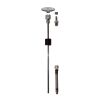AMS Sub-Slab GVP Installation Kit
Features
- Everything needed to install up to five permanent sampling points
- Expedited repair and warranty service
- Lifetime technical support
- More
Overview
Sub-Slab Gas Vapor Probe (GVP) Kits are used to sample for volatile organic compounds (VOCs) beneath floor slabs during vapor intrusion investigations. Sub-slab kits provide a semi-permanent probe that allows for repeated sampling over time in order to assess the potential of contaminated vapor intrusion beneath the floor slab of a building.
This kit contains everything needed to install up to five permanent sampling points.
- (5) 3" Stainless Steel Implant, 1/4" SS Compression
- (5) Sub-Slab Tube Plug (FEP)
- (5) Female Connector SS-400-7-4
- (5) Plug HH-1/4 NPT
- (5) Stainless Steel Hose Barb Adapter SS-4-HC-1-4
- (5) 1/4" X 12" Sub-Slab Stainless Steel Vapor Shaft Tube
- (5) Sub-Slab Gas Vapor Probe Tamper-Resistant Top Cap
- (1) 1/4" Mini Stainless Steel Ball-Valve Adapter
- (1) 1" X 16" SDS Max Masonry Bit
- (1) 2" X 17" X 22" Carbide Tip SDS Max Core Bit
- (1) Spanner Screwdriver #14 Screw Size
- (1) 1/4" Tee Handle Allen Wrench
- (1) Small Carrying Case
In The News
Farmer-invented automated soil sampler reduces human error
A North Carolina farmer has developed a mobile soil sampling system with virtually no risk of human error, Southeast Farm Press reported. Allan Baucom, a grain and cotton farmer with more than 6,000 acres around Monroe, N.C., built the automated soil sampler to keep up with his expanding agricultural operations -- and growing variety of soil types. Named “the Falcon”, the sampler can take up to 12 samples and once, and store 200 before being unloaded. Two Falcons currently exist: one works Baucom’s farm, while the other operates on farms around the country to ensure the sampler’s efficiency in different environments. The sampler is expected to be made available soon, and will host new features, such as computer-interfaced electronic system for use with a laptop or tablet.
Read MoreAmazon sediment studied through Andes trip down tributary
A team of researchers led by scientists from the University of South Carolina Dornsife traveled to the Peruvian jungle to understand how sediment and plant matter travel down the Andes Mountains and into the Amazon River system, according a first-person account from Sarah Feakins, assistant professor of earth sciences at USC Dornsife. The team focused on a tributary to the Amazon River, the Kosnipata River. They started at the headwaters, traveling up treacherous gravel mountain roads. They ended in the Amazonian floodplain, where Feakins said the river was orange from colloids in the soil. The team spent most of their time collecting and filtering water to obtain sediment samples. Feakins described the work as collecting by day and filtering by night.
Read More50-year fertilizer study shows mixed results on soil quality
A new report authored by researchers from the University of Nebraska-Lincoln suggests that the use of inorganic nitrogen and phosphorus for fertilization improves crop yields, but can have negative impacts on soil quality, the American Society of Agronomy has reported. A study of crop lands in western Kansas has shown that inorganic fertilization increases organic carbon stocks while damaging soil’s structural quality. Researchers collected soil samples from experimental fields fertilized with various amounts of inorganic fertilizers to determine how different nutrient levels might impact soil quality. The results showed that applying nitrogen and phosphorus at high rates can expedite soil erosion and cause other structural issues.
Read More






